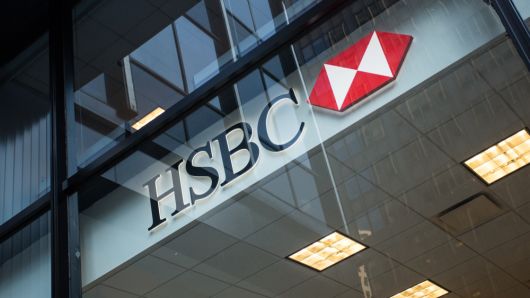
HSBC, Europe’s largest bank, said on Monday its its third-quarter reported pre-tax profit jumped 28 percent from a year ago to $5.922 billion.
The bank’s revenue for the July-to-September quarter was $13.798 billion, 6.32 percent higher than the same period a year ago.
Despite those improvements, the bank’s reported pre-tax profit and revenue for the quarter slightly missed expectations, according to analyst forecasts compiled by data firm Refinitiv.
Other key financial metrics that analysts were watching:
- Adjusted profit before tax was $6.193 billion in the third quarter, 16 percent higher than the same period a year ago.
- Net interest margin, a measure of lending profitability, was at 1.67 percent as of Sept. 30, HSBC said. That’s higher than the 1.63 percent seen a year ago.
- Operating expenses for the quarter were $7.966 billion, down from $8.546 billion in the period from July to September in 2017.
“These are encouraging results that demonstrate the revenue potential of HSBC,” the bank’s group chief executive, John Flint, said in a statement accompanying the earnings release.
HSBC’s Hong Kong-listed shares jumped 5 percent after the lunch break. Its shares in both London and Hong Kong have fallen by more than 20 percent since the start of the year as global growth prospects are increasingly threatened by uncertainties surrounding trade.
Analysts had foreseen an improvement in HSBC’s third-quarter earnings, but they warned that investors would likely pay more attention to the bank’s guidance on its business prospects in the coming months.
“We think there are risks going forward for HSBC,” Kevin Leung, executive director of investment strategy at Haitong International Securities, said ahead of the earnings announcement.
“We’ve seen a flurry of downgrades, we’ve seen the share price coming down,” he told CNBC’s “Squawk Box.”
HSBC is headquartered in London but most of its revenue comes from Asia.
A slowdown in economic activity in China will weigh on the bank’s key business in Hong Kong, where lending profitability is stagnating, analysts noted. Adding to the negative outlook is the recent sell-off in global markets, which will challenge the bank’s trading business, the analysts said.
J.P. Morgan Chase is one firm that downgraded its forecast for HSBC.
“The risks as we see it are continued weakness, particularly in the capital markets as well the wealth management business given some of the macroeconomic trends that we see in the region,” James Sullivan, head of Asia ex-Japan equities research at J.P. Morgan Chase, told CNBC’s “Street Signs.”
“HSBC has a significant trade finance business as well so a lot of the trade tensions we’ve talked about will also be risk factors,” he added.
Those risks are likely to steal the limelight from what’s expected to be an improvement in HSBC earnings. The bank is forecast to post a $5.99 billion in profit before tax in the third quarter, 29.8 percent higher than the same period last year, according to Refinitiv.
Revenue is projected to grow 7.7 percent year-over-year to $13.98 billion, according to Refinitiv data.
“I think a lot of investors will be watching the share price performance closely today, maybe today will represent another drop in market value and the share price of the company. So, I think investors need to be cautious about it,” Ronald Wan, non-executive chairman at Partners Financial Holdings, told CNBC’s “Street Signs.”